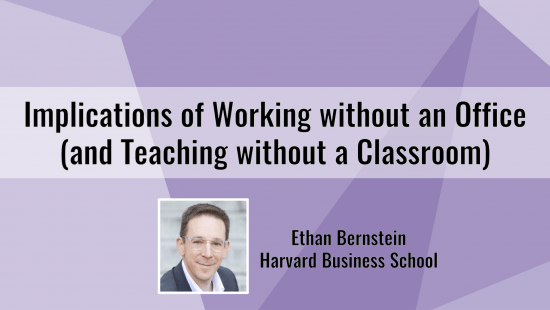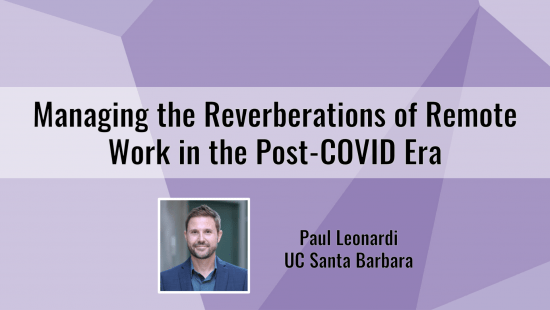
Opening Keynote: Ethan Bernstein
The opening keynote address will be given by Ethan Bernstein, the Edward W. Conard Associate Professor of Business Administration at the Harvard Business School. The keynote is titled “Implications of Working Without an Office (and Teaching Without a Classroom)”. It will examine the impacts of COVID-19 and remote work on employees, and discuss factors organizations now must consider when deciding whether and how to re-open offices.
In early 2020, the world began what is undoubtedly the largest work-from-home experiment in history. Now, as countries reopen but Covid-19 remains a major threat, organizations are wrestling with whether and how to have workers return to their offices. Leaders need to be able to answer a number of questions to make these decisions. Primary among them is “What impact has working from home had on productivity and creativity?” To help answer that question, this study aims to explore how employees have fared since they began working virtually. To that end, Professor Bernstein and his co-authors surveyed a diverse group of more than 600 U.S.-based white-collar employees during the second half of March 2020 and have continued to do so every two weeks since then. In this keynote, Professor Bernstein will share some of their findings—and the implications for what comes next (in workplaces and in the classroom).

Keynote: Paul Leonardi
The keynote address will be given by Paul Leonardi, the Reece Duca Professor of Technology Management at UC Santa Barbara. He holds appointments in the Technology Management Program (TMP) and the Department of Communication. This keynote will be “Managing the Reverberations of Remote Work in the Post-COVID era”.
The rapid shift to remote work during the COVID-19 pandemic has brought many changes to the way people work. As people have struggled to work with team members who are not co-present and to manage the effects of Zoom fatigue and communication overload, we’ve learned a great deal about the first-order effects of remote work. But these changes in the technologies people use and the way that work is allocated are also bringing second and third-order effects to the way teams work and organizations function. In this talk, Professor Paul Leonardi will explore these emerging reverberations of remote work for how we manage groups and teams, for how workers continue to learn and find job satisfaction, and for how we design our organizations. To do so, he will discuss how the changes in the way people use technologies are reshaping how attention is allocated in organizations and how subtle changes in the locus of information and data are changing who has the power within our organizations.
